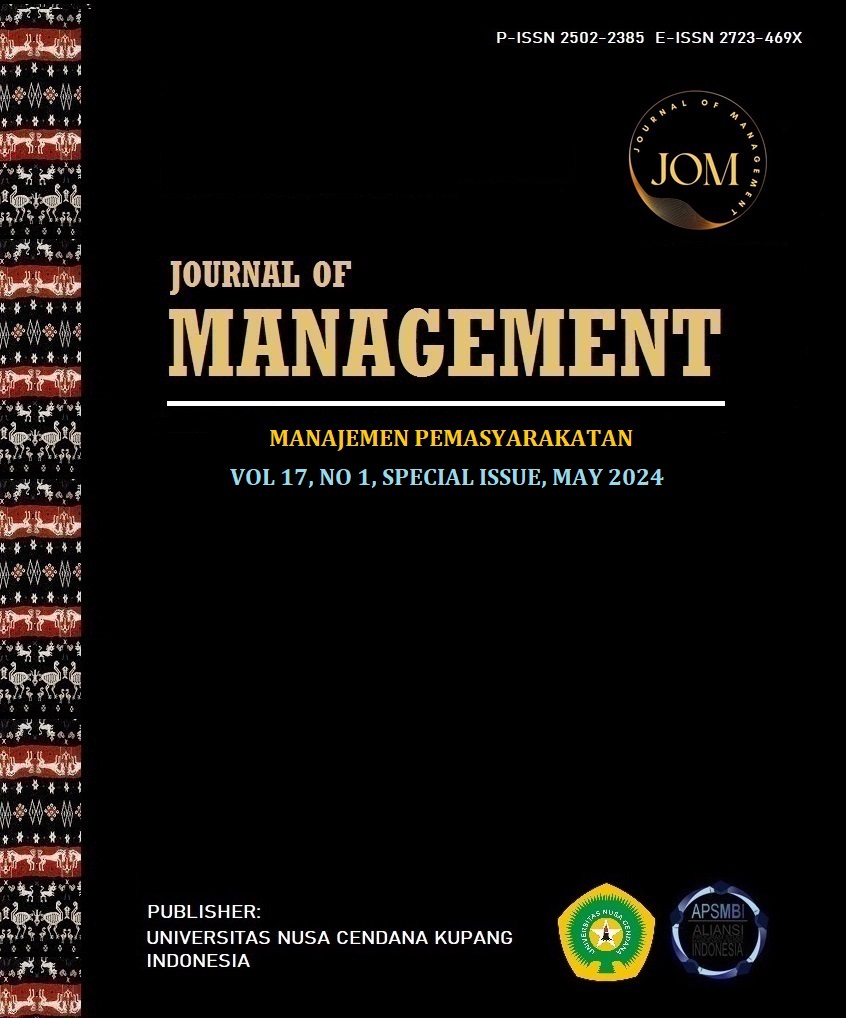PENGARUH SELF CONTROL TERHADAP RESIDIVISME NARAPIDANA DI LEMBAGA PEMASYARAKATAN KELAS IIA PADANG
Abstract
This study examines how Self Control affects Prisoner Recidivism at the Class IIA Padang Correctional Institution. The sampling technique used in this study used the formula from Krejcie and Morgan. So that the number of samples obtained was 165 recidivist prisoners out of 286 recidivist prisoners of the Class IIA Padang Correctional Institution. The simple linear regression method was used in analyzing the research data. From the results of data processing carried out, it is known that Self Control affects Prisoner Recidivism at the Class IIA Padang Correctional Institution with an influence level (R-Square) of 64.3%. The findings of this study can help officers to pay more attention to the sustainability of factors that affect Self Control which is an important part of a recidivist's life. In addition, this research contributes in a new way, namely as literature in the field of corrections.
Keywords: Self Control; Recidivism; Correctional Institution
Downloads
References
Creswell, J. W, and Creswell, J.D. (2018). Research Design. Paper Knowledge . Toward a Media History of Documents.
Fazel, S, and Achim W. (2015). “A Systematic Review of Criminal Recidivism Rates Worldwide: Current Difficulties and Recommendations for Best Practice.” PLoS ONE 10 (6): 1–8. https://doi.org/10.1371/journal.pone.0130390.
Gottfredson, M. R., and Travis H. (1990). A General Theory of Crime. Redwood City: Stanford University Press. https://doi.org/doi:10.1515/9781503621794.
Grasmick. (2006). “Self-Control Depletion and the General Theory of Crime.” Journal of Quantitative Criminology 22 (3): 263–77. https://doi.org/10.1007/s10940-006-9011-1.
Grasmick, H. G., Charles R. T., Robert J. B., and Bruce J. A. (1993). “Journal of Research in Crime And.” https://doi.org/10.1177/0022427893030001002.
Hanson, R. K. (2018). “Long-Term Recidivism Studies Show That Desistance Is the Norm.” Criminal Justice and Behavior 45 (9): 1340–46.
https://doi.org/10.1177/0093854818793382.
Hidayati, C. (2018). Hubungan self control dengan intensi dating violence pada remaja akhir.
Krejcie, R. V., and Daryle, M. (1970). “Determining Sample Size For Research Activities,” 607–10.
Maltz, M.D. 2001. Recidivism. Florida: Academic Press, Inc.
Marcdante , K. J, Kliegman R. M., Jenson, H. B., Behrman, R. E. (2014). “Nelson Ilmu Kesehatan Anak Essensial” a: 11–26.
McGuire, J., Charlotte, A. L. B., Ruth, M. H., Clive, R. H., Juliet, H., and Emma, J. P. (2008). “Evaluation of Structured Cognitive–Behavioural Treatment Programmes in Reducing Criminal Recidivism.” Journal of Experimental Criminology 4 (1): 21–40. https://doi.org/10.1007/s11292-007-9047-8.
Nurningtyas, F., & Yulia A., Jurusan Psikologi, Fakultas Ilmu Pendidikan, and Universitas Negeri Yogyakarta. (2021). “Pengaruh Kontrol Diri Terhadap Intensitas Penggunaan Smartphone Pada Remaja” 3: 14–20.
Nurrahma, E. (2014). “Perbedaan Self Esteem Pada Narapidana Baru Dan Residivis Di Lembaga Pemasyarakatan Kelas I Malang.” Malang.
Packer, G., David, B., Day, E.D. and Kelly, W. (2009). “Criminal Thinking and Self-Control among Drug Users in Court Mandated Treatment” 9 (1): 93–110. https://doi.org/10.1177/1748895808099182.
Putri, T. U. (2018). “Faktor-Faktor Yang Melatarbelakangi Narapidana Menjadi Residivis,” 1–35.
Rusdianto, S. A. (2018). “Tinjauan Kriminologis Terhadap Residivis Tindak Pidana Pencurian (Studi Kasus Di Kota Makassar 2010-2016).” Skripsi Universitas Hasanudin Makasar.
Sari and Laily, L. (2013). “Pengaruh Harapan Terhadap Kecenderungan Residivis Pada Narapidana.” Ilmu Hukum 2: 36–42.
Sohn, J. S., Adrian, R., and Soo, J. L. (2020). “The Utility of the Psychopathy Checklist-Revised (PCL-R) Facet and Item Scores in Predicting Violent Recidivism.” Aggressive Behavior 46 (6): 508–15. https://doi.org/10.1002/ab.21922.
Yusuf, U., and Raissa, P. (2011). “Pengaruh Terapi Kognitif Perilaku Terhadap Peningkatan Kontrol Diri Pada Residivis.” Jurnal Intervensi Psikologi (JIP) 3 (2): 245–56. https://doi.org/10.20885/intervensipsikologi.vol3.iss2.art6.

 Luthfie Al Fayed Shamirazie(1*)
Luthfie Al Fayed Shamirazie(1*)



